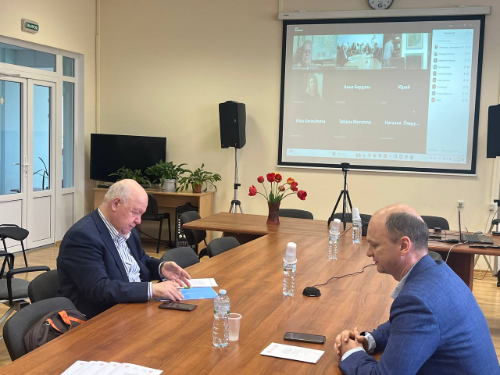– As the name of the conference suggests, the focus is on border regions, but we certainly do not limit the thematic range so narrowly. Socio-economic development is truly multifaceted - just as much as our society is multifaceted. It includes issues of demography, culture, human potential, economic and others. So, we can say that the conference theme is multidisciplinary, as the presentations will demonstrate, – noted Nikolai Kolesnikov.
Alexander Katrovsky, Professor of the Department of Geography at Smolensk State University, member of the Coordinating Board of the Russian Social Geographers Association, emphasized in his opening remarks that borderland studies are more efficient when conducted on both sides of the border - with foreign colleagues, and gave examples of successful joint studies of the Russian-Belarusian borderland.
The audience was greeted by Valery Shlyamin, Deputy Director and Research Director of the Institute of North European and Arctic Studies at Petrozavodsk State University. He emphasized the study of northern Arctic border regions - the topic he covered in detail in his presentation.
The first lecture of the plenary session was delivered by Zhanna Ermakova, RAS Corr. Fellow, Director of the Orenburg Branch of the Institute of Economics of the RAS Ural Branch. It dealt with the socio-economic development of the Russian-Kazakh border regions in the Ural zone. Alexander Sebentsov, Acting Deputy Director of the RAS Institute of Geography gave a talk on the experience of cross-border regionalization along the internal and external borders of the European Union, as well as the possibilities and basic principles of transferring this experience to the Russian borders.
Professor of the Transbaikal State University, Leading Researcher of the Transbaikal Scientific Center of the Institute of History, Archaeology and Ethnology of the RAS Far Eastern Branch Tatyana Kuchinskaya spoke about the socio-economic aspects of the new security model for China's border regions, defined the essence of the new concept of borderland security management (“five major securities" model) and described its main regional practices - for the South- Western, North-Western and North-Eastern regions of China.

The conference format is a hybrid of offline and online. The photo shows the participants in the Institute of Economics Meeting Room
Chief Researcher of the Institute for Regional Economic Studies RAS Margarita Zamyatina made a presentation on the trends and prospects for sustainable development of Russian regions. Valery Shlyamin followed up his opening speech with a talk on the development strategy for arctic and subarctic border areas of Northwest Russia.
Leading Researcher of the Central Economics and Mathematics Institute RAS Irina Gerasimova and Researcher of the Central Economics and Mathematics Institute RAS Elena Gerasimova conducted a comparative analysis of the socio-economic situation in the interior and border regions of the Russian Federation in the context of the “Strategy for Spatial Development of the Russian Federation until 2030” and the “Unified Plan for Achieving the National Development Goals of the Russian Federation until 2030 and in the long term until 2036”.
The topic of the presentation by Oleg Tolstoguzov, Chief Researcher at the Institute of Economics KarRC RAS, was “Does the Neighborhood of Countries Influence Scientific Collaborations? (analysis of joint publications in the Scopus system)”. His study examined the factors influencing the joint publication activity of scientists from Europe and Russia. Assuming the hypothesis of the significance of the gravity model and its parameters, the conclusion is made about the significance of both the neighborhood of countries and the attractiveness of international publishing houses. Associate Professor of the Karelian Branch of the Russian Presidential Academy of National Economy and Public Administration Tatyana Sachuk elaborated on inter-municipal cooperation as a factor of socio-economic development of border regions, with the Republic of Karelia as the case study.
Thus, the plenary session covered the entire thematic range of the conference regarding the study of socio-economic development of border regions at the municipal, regional, federal and inter-country levels.
May 30 will be the day for five breakout sessions: “Modern challenges for border regions and cities in the new geopolitical settings”, “Opportunities and prospects for interactions between border areas in the digital economy”, “Development of cross-border cooperation at the state, regional and non-governmental levels”, “Tourism and historical and cultural heritage as a basis for cross-border regional cooperation”, “Socio-ecologo-economic development of Russia's northern and Arctic territories”.
A special feature of this year's conference was the presentation contest for young scientists, organized by the Young Scientists' Council of the Institute of Economics KarRC RAS.







